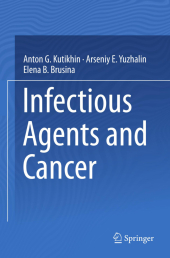 Neuerscheinungen 2015Stand: 2020-02-01 |
Schnellsuche
ISBN/Stichwort/Autor
|
Herderstraße 10
10625 Berlin
Tel.: 030 315 714 16
Fax 030 315 714 14
info@buchspektrum.de |

Elena B. Brusina, Anton G. Kutikhin, Arseniy E. Yuzhalin
(Beteiligte)
Infectious Agents and Cancer
2013. 2015. x, 118 S. 12 Tabellen. 235 mm
Verlag/Jahr: SPRINGER NETHERLANDS; SPRINGER 2015
ISBN: 9401780730 (9401780730)
Neue ISBN: 978-9401780735 (9789401780735)
Preis und Lieferzeit: Bitte klicken
This book describes and analyzes connections between unconventional carcinogenic infectious agents and cancer. It features helpful tables that systematize the key information on the field and a list of all infectious agents suspected in cancer causation.
_Over the years of cancer investigation a lot of discoveries in this field were made, and many associations between various biological carcinogens and cancer were revealed. Some of them are credibly determined, thus these infectious agents (human papilloma virus, hepatitis B virus, hepatitis C virus, Epstein-Barr virus, human herpes virus 8, human T-cell lymphotropic virus 1, human immunodeficiency virus, Merkel cell polyomavirus, Helicobacter pylori, Opisthorchis viverrini, Clonorchis sinensis, Schistosoma haematobium) are recognized as carcinogens and probable carcinogens by International Agency for Research on Cancer (IARC). The problem is of large importance, since share of infectious agents-related cancer cases is steadily increasing, reaching 25% according to certain estimates. It is worth noting that many of cancer cases are caused by infectious agents other than "conventional ones" like HPV, EBV, HBV, HCV, H.pylori etc. In recent years, a number of significant breakthroughs in the field were performed, such as the discovery of the microbiota role in cancer causation.
Preface
1 The Criteria of Inclusion of Infectious Agents in the List of Biological Carcinogens
2 General Mechanisms of Biological Carcinogenesis
2.1 Metabolic mechanisms
2.2 Immune mechanisms
2.3 Mechanisms mediated by the carcinogenic activity of the bacterial and protozoan toxins
3 The Role of Bacteria in Cancer Development
3.1 The Role of Bacteria in Cancer of the Digestive Tract
3.2 The Role of Bacteria in Cancer of the Respiratory
3.3 The Role of Bacteria in Cancer of the Genitourinary Tract
3.4 The Role of Bacteria in Cancer of the Hematolymphopoietic Tract
3.5 Additional Bacteria Anecdotally Associated with Cancer
4 The Role of Protozoa in Cancer Development
4.1 Toxoplasma gondii
4.2 Cryptosporidium parvum
4.3 Trichomonas vaginalis
5 The Role of Helminths and Fungi in Cancer Development
5.1 Taenia spp
5.2 Strongyloides stercoralis.
5.3 Fasciola hepatica, Trichostrongylus colubriformis, Paracoccidioides brasiliensis.
6 Organ Microbiota in Cancer Development: the Holy Grail of Biological Carcinogenesis
6.1 The Role of Oral Microbiota in Cancer Development
6.2 The Role of Gut Microbiota in Colorectal Cancer Development
7 Conclusions: Are We There Yet?


